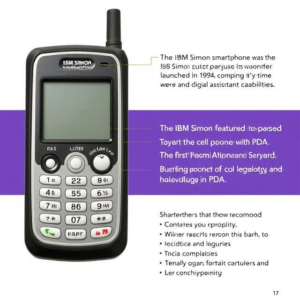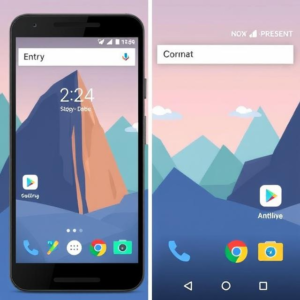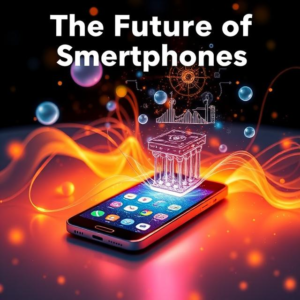What Was the First Smartphone?
The first smartphone was the IBM Simon Personal Communicator, launched in 1994. It was ahead of its time, combining a cell phone with PDA (Personal Digital Assistant) capabilities. The IBM Simon featured:

- A touchscreen display (monochrome LCD)
- Calling and text messaging capabilities
- Email and fax functionality
- Calendar and notepad applications
- Battery life of about an hour
While primitive by today’s standards, the IBM Simon laid the foundation for future mobile computing and smartphone innovations.
The Evolution of Smartphones
1. The Early 2000s – The Rise of Feature Phones
Before smartphones became mainstream, feature phones dominated the market. Brands like Nokia, BlackBerry, and Palm introduced models with physical keyboards, early internet access, and basic apps.
2. The Arrival of Apple iPhone (2007)
In 2007, Apple changed the game with the iPhone. Its features included:
- Capacitive touchscreen (no stylus needed)
- Full internet browser (Safari)
- App Store for third-party applications
- Multi-touch gestures
The iPhone paved the way for a touchscreen-dominated smartphone era.
3. Android’s Entry (2008-Present)
With the launch of the HTC Dream (T-Mobile G1) in 2008, Android OS entered the competition. Android smartphones introduced:

- Open-source flexibility
- Customizable user interfaces
- Third-party app support
- Multiple hardware choices
Today, Android and iOS dominate the smartphone industry.
How the First Smartphone Changed Technology Forever
1. The Shift from Communication to Mobile Computing
The first smartphone transitioned mobile devices from simple calling and texting tools to mini computers. Today, smartphones serve as:
- Portable workstations (emails, cloud computing, remote work)
- Entertainment hubs (streaming, gaming, social media)
- Navigation assistants (GPS, Google Maps, ride-hailing apps)
2. Internet in Your Pocket
The ability to access the internet on the go has changed:
- E-commerce (Amazon, eBay, AliExpress)
- Social networking (Facebook, Instagram, TikTok)
- Instant information access (Google Search, Wikipedia, voice assistants)
3. Revolutionizing Photography
The smartphone camera industry has advanced from low-resolution sensors to today’s AI-powered, multi-lens cameras. Features like:
- Portrait mode & Night mode
- 4K video recording
- Augmented Reality (AR) features
have transformed photography and videography into a mainstream hobby.
4. Rise of Mobile Apps
The first smartphone introduced basic applications, but modern smartphones support:
- AI-driven apps (Google Assistant, Siri, Alexa)
- Gaming apps (PUBG, Call of Duty Mobile, Genshin Impact)
- Health tracking apps (Google Fit, Apple Health)
5. Transformation of Business and Work Culture
From remote work tools like Zoom, Microsoft Teams, and Slack to mobile banking & payments (PayPal, Apple Pay, Google Pay), smartphones have made business operations more flexible and efficient.
The Future of Smartphones

1. Foldable & Rollable Displays
Brands like Samsung, Oppo, and Motorola are experimenting with foldable phones, offering larger screens without increasing phone size.
2. AI and Machine Learning
AI-powered voice assistants, predictive texting, and automation will make smartphones even more intuitive.
3. 6G and Beyond
With 5G already rolling out, 6G networks in the future will bring instant connectivity, ultra-fast downloads, and smart city integration.
4. Augmented Reality (AR) and Virtual Reality (VR)
Smartphones will soon replace PCs for immersive experiences in gaming, education, and business collaboration.
The first smartphone was a stepping stone in technology evolution. From the IBM Simon to today’s AI-powered devices, smartphones have changed how we live, work, and interact with the world. The future promises even more innovation, ensuring that smartphones remain a cornerstone of modern technology.
Whether it’s business, education, communication, or entertainment, the impact of smartphones on our daily lives is undeniable. The revolution is far from over—the best is yet to come! 🚀